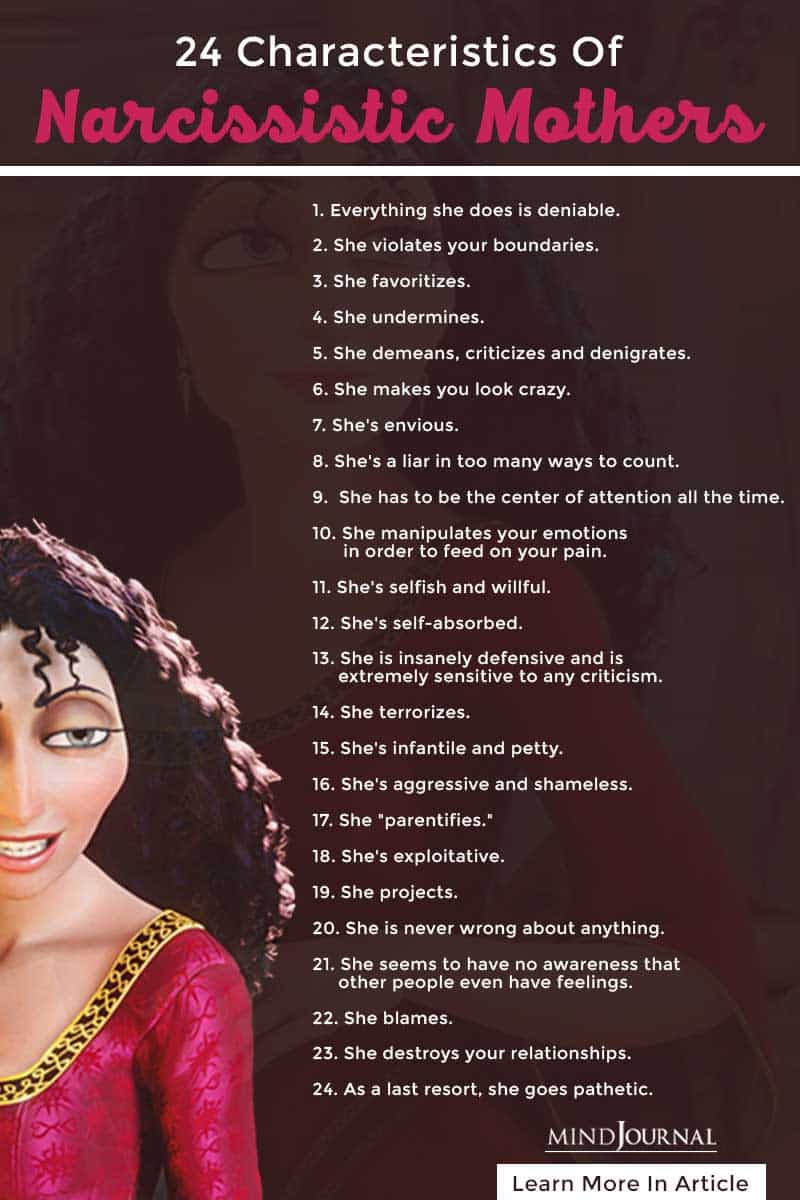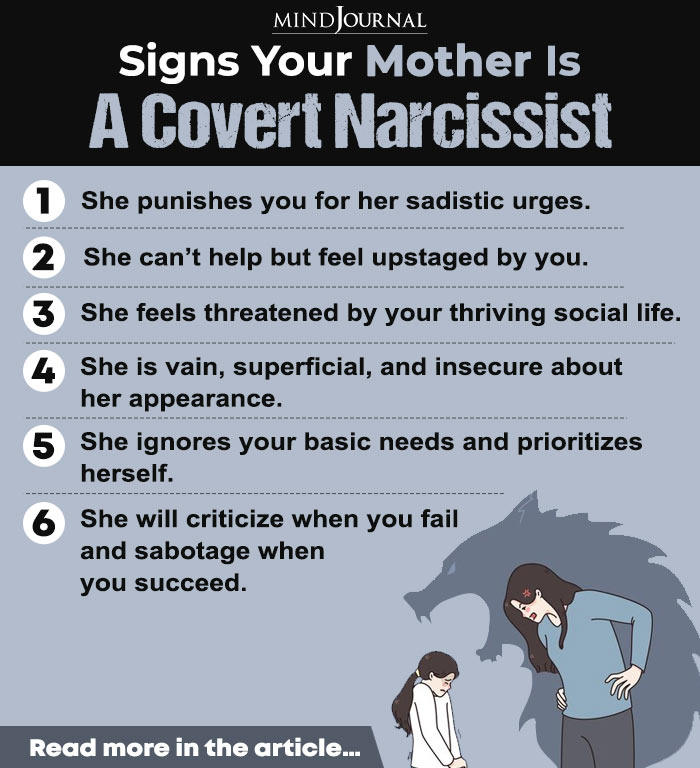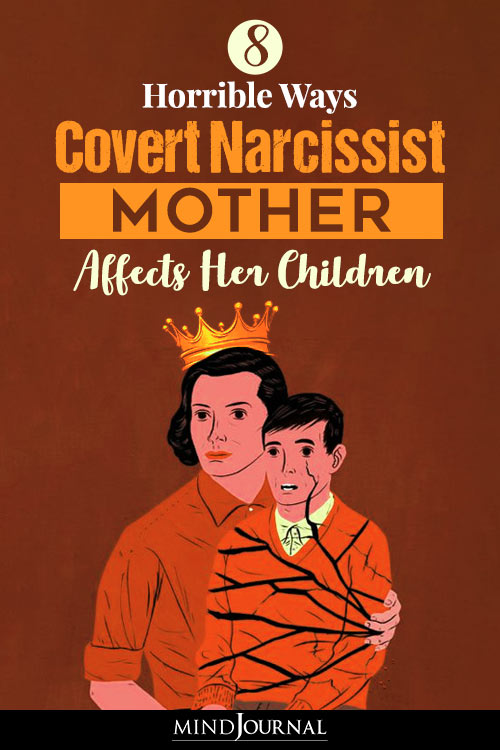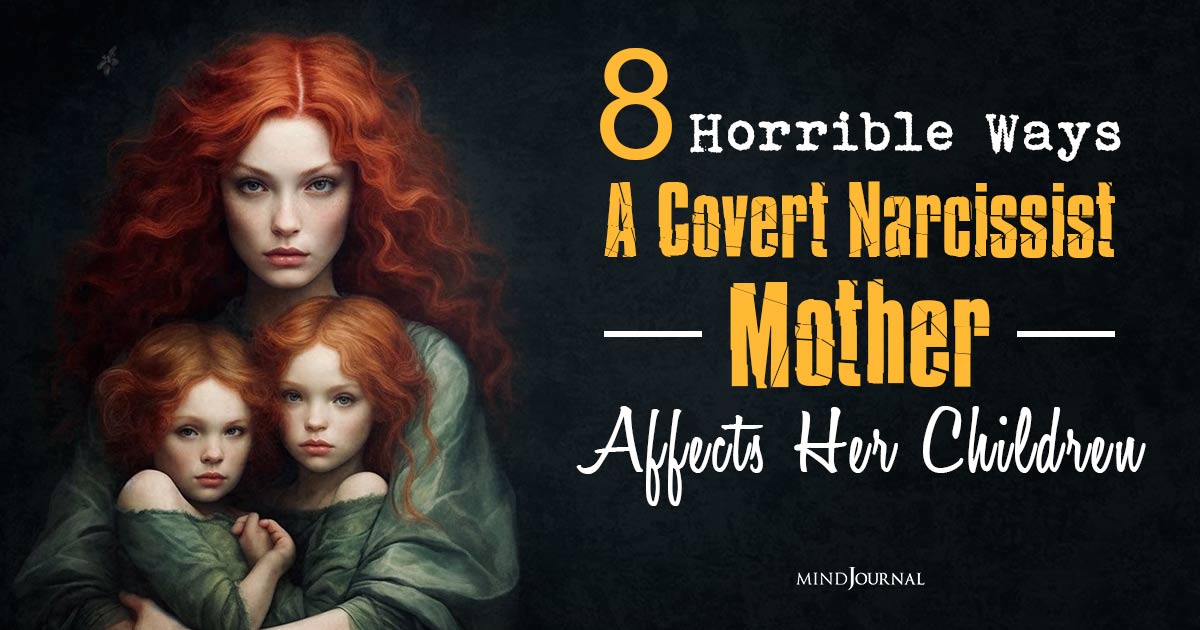Your mother has devoted her entire life to you, then why does a nagging feeling tell you that she is a narcissist? Do you have childhood memories that get dismissed as your imaginations? Do you often feel confused and inadequate? Growing up with a covert narcissist mother can do this to you.
You are left with confusion and questions about your early years and no clear insights. So what’s a covert narcissist mother and how can she affect her child’s development? Let’s know in detail about this rather sensitive topic which doesn’t get much attention and coverage.
Related: 63 Most Commonly Used Phrases By Narcissistic Mothers
Narcissistic Mothers

The reason why we don’t know much about narcissistic mothers or for that matter, about narcissistic women, might be the biased belief that female narcissists are rarer to find.
Earlier studies supporting this notion have claimed that 75% of the people who exhibit narcissistic tendencies are in fact male. However, more recent studies indicate that when it comes to covert narcissism, women are greater in number than their male counterparts.
Covert narcissism, also known as vulnerable narcissism is hard to identify, because, a vulnerable covert narcissist is often introverted, shy, and displays symptoms that are common with anxiety disorder and borderline personality disorder.
Nevertheless, a covert narcissist can cause significant damage to the emotional health of any unsuspecting person.
Especially, when a female covert narcissist becomes the covert narcissist mother, the most malignant type of narcissist, she can unleash severe psychological trauma on her children and hinder their life directly and indirectly, even in their adulthood.
How Does A Covert Narcissist Mother Affect Her Children?
Let’s find out how a covert narcissist mother can disrupt the well-being of her children that transcends well into their adult life.
1. Triangulation
A covert narcissist mother often uses the psychological ploy of triangulation, where her children are pitted against each other. In such cases, her preferred child is the golden child, while the other becomes the Scapegoat.
“Why can’t you be more like your brother?’’ or “Your sister has a better taste in men, than you”, are some of the things narcissistic mothers say.
Such constant comparison and exploitation of interpersonal relationships make the flawed child believe that they are not good enough. As a result, they tend to spend all their life trying to win their mother’s approval and affection by proving their worth.
2. Invalidation
A covert malignant narcissist is devoid of empathy. Naturally, a covert narcissist mother will fail to attune into the emotional demands of their offspring. She will not accept and validate their pain and meet their basic needs.
Mothers are our primary caregivers. As infants, we learn about self-worth and how to form attachments with others, based on how we are cared for and nurtured by our mothers.
When a young child’s emotions are not validated by their mother, it affects their psychological development, emotional regulation, and attachment style.
As a result, they grow self-esteem issues and are set up for unhealthy romantic relationships, and people-pleasing.
3. Gaslighting
When the child starts getting older and begins to question the toxic behaviors of their mother, the covert narcissist mother changes the narrative and causes the child to have doubts about their memory or perception.
Covert narcissistic mother traits include manipulation techniques like gaslighting and playing blame games. Such a mother will try to convince the victim kid that what they remember happening to them is not true or it was done keeping the best interest of the child in mind, ie., to teach them discipline.
It goes without saying that such manipulations mess up the child’s mind and make them doubt themselves even more.
Related: 8 Powerful Phrases To Shut Down Gaslighting With Confidence
4. Dysfunctional Extensions
A covert narcissist mother treats her children as extensions of her own life. She is mindful of how her children are received by others and often exhibits them to the world as her proud possessions.
Everyone sees a proud mother who has done a great job raising her kids, but behind closed doors, she is critical and abusive.
Kids of such narcissistic mothers have a hard time coming out of their mothers’ shadows and building their own identities.
5. Shaming
The covert narcissist mother resorts to verbal abuse and other negative reinforcement, such as guilt-tripping, withholding her affection, etc., only to shame the child for their perceived flaws.
The toxic mother pushes her children to accomplish more in all aspects of life, so that it may reflect well on her.
Repeated emotional abuse of this sort can damage the young child’s psyche and as adults, they might become hypersensitive to criticism and negative feedback.
6. Comparing
To add insult to injury, a covert narcissist mother will not only draw unhealthy comparisons between her children but also make her kids feel inferior to their peers.
She might openly make derogatory remarks about the physical appearance or academic performance of her children in the presence of their friends and shower praises on the friend.
Such toxic upbringing makes a child lose their confidence and might cause them to feel inadequate for the rest of their life.
7. Competition
A female child bears the brunts of a vulnerable narcissist mother to the most extreme degree.
Covert and dangerous mothers have internalized misogynistic traits and some of them also show signs of Histrionic Personality Disorder. Such toxic mothers feel threatened when their self-created superiority is challenged.
When a girl child grows up to be more beautiful and attractive than her covert narcissist mother, the toxic mother feels outshined and replaced. She also gets insecure about the fact that her puppet is soon going to outgrow the clutches of the covert narcissist parent.
As a defense mechanism, the covert narcissistic mother will start competing with her daughter, often flouting the most disturbing sexual boundaries by seducing her daughter’s friends or partners.
In the case of a son or sometimes even with a daughter, emotional incest is often seen at play, where the insecure mother makes her children responsible for her emotional needs.
Instead of being the parental figure, the covert narcissist parents depend on the child for their relational and emotional satisfaction.
All these can lead the child to develop trust issues and disrupt their future romantic relationships.
Related: 10 Signs You Have A Toxic Mother-In-Law and How To Deal
8. Boundary Breaking
Other instances of intrusive behaviors by a covert narcissist mother might include barging in the room of the child unannounced, checking their phones, reading their diaries, eavesdropping on their conversations, and more.
A narcissistic mother has no regard for her child’s privacy and boundaries. Even after growing up, children of a covert narcissistic parent might struggle with setting boundaries.
Signs Your Mother Is A Covert Narcissist:
The following signs are markers of a covert narcissist mother.

- She gets a sadistic pleasure seeing you in pain.
- Pathologically envious and always strives to be the center of attention.
- She creates misunderstandings among your social groups and sabotages your relationships.
- She is superficial, materialistic, and obsessed with her personal appearance.
- She selfishly puts her needs ahead of yours.
- Encourages you to achieve more but feels threatened by your growing independence.
How to Deal With A Covert Narcissist Mother?
You might consider the below-given tips to manage your covert narcissist mother:
- Learn to identify the traits of a covert narcissistic mother
- Peacefully call her out for her toxic behaviors
- Understand her point of view, without making concessions for her.
- Refrain from engaging in arguments to prove your point
- Be confident and don’t second guess yourself
- Say no and stick to your ground when something is unacceptable
- Communicate clearly and be assertive of your boundaries
- Realize it’s about her and not about you
- Work on your reactions and self-restraining behavior
- Find someone who can help you navigate through this issue
Related: The 10 Types Of Toxic Mothers: Understanding The Traits That Harm Their Children
Outgrow To Grow
A covert narcissist mother will never appreciate you living your life with a sense of agency. She will benefit from your poor impulse control and lack of boundaries. Her insatiable thirst for control, sense of entitlement, and insecurities will force you to remain in her shadow.

If you want to have a healthy adult life and form positive relationships, you need to identify these toxic behavioral patterns and outgrow them. Seeking professional help or peer support can help you in this crusade.
Frequently Asked Questions
What’s a narcissistic mother?
A narcissistic mother lacks empathy towards her children; she fails to care for them, nurture them, and meet their basic needs.
What are covert narcissist signs?
The several signs of covert narcissism include manipulation, blame game, comparing, and other subtle mind games.
What are the 4 types of narcissism?
The 4 types of narcissism are Grandiose Narcissism, Covert Narcissism, Malignant Narcissism, and Communal Narcissism.
How does a narcissistic mother affect her daughter?
A narcissistic mother can affect the development of her daughter in many ways, such as making her insecure about her looks, her romantic relationships, and her overall sense of agency.
How does a narcissistic mother behave?
A narcissistic mother behaves in a dysfunctional and abusive way, causing her children to develop attachment issues and poor self-image.













Leave a Reply